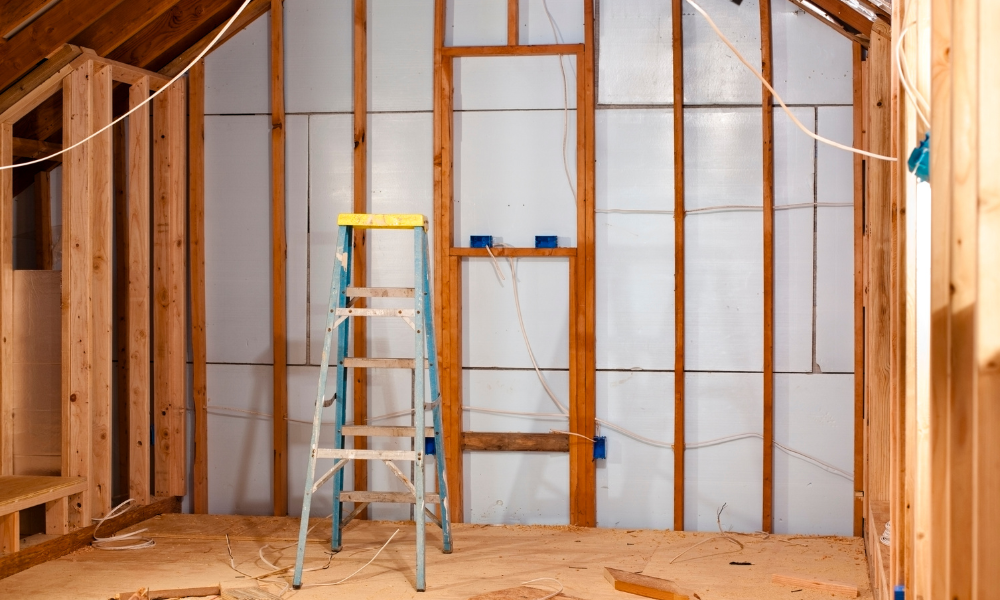The Short Answer
Flipping houses involves buying a property, renovating it, and then selling it for a profit. While it can be a lucrative business, it also requires a significant investment of time, money, and effort. While TV shows and influencers make house flipping look easy, it generally requires a lot of planning, research, and hard work.
To be successful in house flipping, a real estate investor needs to approach the process with careful planning, sound financial management, and effective project management skills. Success in house flipping requires:
- Careful research of the local real estate market
- Building a strong team of professionals including real estate agents, contractors, and accountants that can offer advice and support
- Creating a solid financial plan with a budget and minimizing financial risk for personal finance
- Close management of the renovation process
- Pricing the property correctly according to the current market
Jump To
The Easiest Aspects of House Flipping
While house flipping generally requires hard work and detailed planning, there are some easier aspects which require less effort or can be done easily from home. Here are some of the easiest aspects of house flipping:

1. Finding Investment Properties
Finding the right real estate deal is the key to making a success when flipping houses. A quick online search will show you that there are plenty of resources to find investment properties online. If none of these are successful, there are also real estate agents to consider, foreclosure auctions and more. Finding investment properties isn’t difficult, and often it can be done from the comfort of your home.
2. Organizing the Renovation
Once you have found the right investment property, the next step is to plan the updates and changes that will be done. This involves creating a budget, deciding on the scope of the work, and determining the timeline for completion.
You will need to make a detailed list of all the renovations that need to be done and then prioritize them based on what will add the most value to the property. You should also consider factors such as permits, zoning, and building codes when planning the renovation.
This step is considered one of the easier steps of flipping houses because it is a straight-forward process that can be done successfully with some research and under the guidance of real estate professionals.
3. Finding Contractors
When flipping a house, the process of finding real estate contractors is considered an easier step. This is because there are a host of contractors available and finding them simply requires a quick online search. However, choosing the right contractor takes more time and requires research into the contractor’s references and previous work, this is often available online as well, or by sending an email to the contractor.
4. Doing Small Upgrades
Small upgrades on a home are one of the easiest ways to add value and attract more buyers. Smaller, cosmetic upgrades such as painting, installing new flooring, and upgrading light fixtures, can make a big difference to the overall aesthetic of the home and add value. These are easier home improvements to do, that don’t require the work of major renovations and can be done quicker.
5. Property Staging
Once the renovation is complete, the house should be staged before it is sold. Home staging makes the property more attractive and usually helps potential buyers envision what they could do with the home.
Property staging is one of the easier aspects of flipping houses because investors can hire stagers to do the job. Which means there’s no heavy lifting required, and professionals can take over the process.
The Hardest Aspects of House Flipping
Flipping houses is a more hands-on real estate investing strategy than some of the others, and it is a complex process that involves a range of challenges. While the potential for profit is high, it requires careful planning, execution, and management to be successful.

1. Dealing With Unexpected Costs
One of the hardest aspects of flipping a house is dealing with unexpected costs. These expenses can further delay the project, exasperating the already fragile timeline of the flip. Unaccounted costs can significantly reduce the potential profit, making the entire project unprofitable. Examples of these costs include discovering mold, structural issues, or other problems that require additional time and more money to fix.
Unexpected costs are difficult to predict and can derail the entire house flipping project which makes these one of the hardest aspects of flipping house. The danger with unexpected costs is that they can occur at any point without warning and leave investors having to make decisions in a rush to try and salvage the project.
2. Identifying the Right Property
While finding an investment property is one of the easiest aspects of house flipping, figuring out which property is right for house flipping is another story. This process is more complicated and involves knowing what to look for, researching the local property market, finding a property that’s priced right and falls within your budget, and making an offer that gets accepted by the seller amongst stiff competition.
Also, it can be difficult to estimate the renovation and repair costs, which is crucial when it comes to calculating your profit margins on the property. Finding a property that has the potential to earn the highest profit is key, and this requires skill and time.
3. Financing the Project
Fix and flip projects can be expensive and finding the right lender for a fix and flip project can be challenging. New investors who have no previous experience may struggle to find a lender who will provide funding to them without a proven track record. Loans from traditional financial sources aren’t typically geared towards house flipping and are longer term loans that don’t have interest-only options or a structure that works well with house flipping.
However, hard money lenders provide financial solutions geared towards fix and flip projects specifically. With interest-only payments available, and short-term loans, hard money lenders like New Silver provide easy options for real estate investors who are flipping houses.
4. Dealing with Legal and Tax Issues
There are various legal and tax implications that come with flipping houses. On the legal side, there are permits required for certain renovations to be done, and each state will have its own regulations to comply with. The taxes that are involved with house flipping are also a consideration, these may extend beyond property taxes.
Failure to comply with any regulations, get permits or settle the required taxes can result in penalties, fines and legal issues. Which makes the legal side of house flipping one of the most difficult aspects, as investors need to get legal and tax council to make sure that they don’t run into any problems.
5. Selling the Property
Once the renovations are completed, the property needs to be sold for the right price, to generate a gross profit and make the deal successful. This can be one of the hardest aspects of house flipping as investors are at the mercy of the local real estate market, which can change according to economic factors.
Finding the right buyer may take some time, and getting the right amount out of the sale requires pricing the property high enough to cover the costs of the project and low enough to make it attractive. It’s a balancing act, which can take some investors a few tries to get right, but this will result in a higher gross profit when done right.
What Separates Successful House Flippers From Unsuccessful House Flippers?
House flipping can be a lucrative real estate investing strategy, but success in house flipping requires a specific approach. Successful house flippers will tackle the process with careful planning, sound financial management, and effective project management skills.
These are the key aspects that separate successful house flippers from unsuccessful ones:

Extensive research
Successful house flippers do extensive research into their local real estate market. This provides them with a good understanding of current market trends, housing demand, and property values. This is a necessary step for investors to help them identify good properties to flip. These would be undervalued properties, and properties that can offer a high return on investment.
A strong team
One of the most vital aspects of a successful house flip is to have the right team. Once investors have found a team that works, they can use this team for every project, and rest assured that they’re in good hands. Finding a reliable team that includes a real estate agent, contractors, and an accountant will stand investors in good stead as they can rely on their team to get the job done efficiently.
A strong team is vital to each project and is therefore a requirement for successful house flipping overall. A team of reliable professionals will is fundamental on an investor’s house flipping journey, and once a trustworthy team has been established, a mutually beneficial relationship can be formed over the long term.

A solid financial plan
An airtight financial plan is one of the key aspects to house flipping success. Creating a solid financial plan involves forming a realistic budget that includes the purchase price, renovations, taxes, closings costs and any other expenses. This plan should be as detailed as possible, including timelines and contingency plans.
Successful house flippers typically have enough cash reserves to cover any unexpected costs as well, and structure things such that their personal finance remains in tact.
Careful management of the renovation project
For a real estate investor, the success of a house flip lies largely in the completion of the renovation project on time, and within budget. Which means that house flipping requires careful management of the renovation so that the team meets all their deadlines and doesn’t go over budget. This is easier when renovation and repair costs have been accurately estimated. Successful house flippers will stay on top of the work being done, communicate with contractors regularly, and address any issues as soon as they arise.

Adherence to budget
Achieving the highest return on investment is the ultimate sign of success on a house flipping project. This entails setting a strict budget and making sure that it is adhered to, which will also minimize financial risk. Successful house flippers will keep a close eye on their finances throughout the entire process, to make sure that the project is within budget and on the path to providing a good return on investment.
Correct Property Pricing
Once the renovations are complete, pricing the property correctly is vital to getting the best gross profit on the house flipping project. This means that detailed research into the local real estate market will be done, to determine what similar houses are selling for and what the market trends are. Successful house flippers may need to negotiate with potential buyers to get the best possible price.
Final Tips For Completing A Profitable House Flipping Project

In addition to the easiest and most difficult aspects of flipping a house, here are some extra tips to help you complete a profitable house flip:
Hire a good real estate agent: A good real estate agent can help you sell the property quickly and for a good price, which is an important part of a house flip. Look for a real estate agent with experience in your local market and a track record of success.
Market the property effectively: Effective marketing is key to selling the property quickly and for a good price. Use professional photos, create a compelling listing description, and advertise the property on multiple platforms to reach a wide audience.
Learn from your mistakes: House flipping can be a learning experience. If something doesn’t go as planned, take the time to reflect on what went wrong and how you can do better next time. Continuously improving your skills and processes will help you complete more profitable house flips in the future.
Flipping houses can be a profitable real estate investing strategy, but it also comes with its challenges. By understanding the easiest and most difficult aspects of flipping a house, and following these extra tips, you can increase your chances of completing a successful and profitable house flip to ultimately generate more money.

